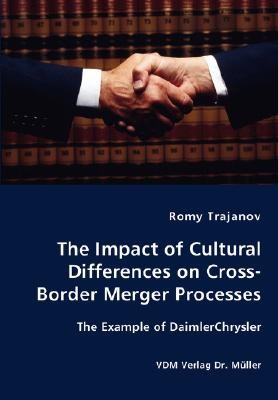
- We will send in 10–14 business days.
- Author: Romy Trajanov
- Publisher: VDM Verlag Dr. Mueller E.K.
- Year: 2007
- Pages: 144
- ISBN-10: 3836428105
- ISBN-13: 9783836428101
- Format: 17 x 24.4 x 0.8 cm, minkšti viršeliai
- Language: English
- SAVE -10% with code: EXTRA
The Impact of Cultural Differences on Cross-Border Merger Processes - The Example of DaimlerChrysler (e-book) (used book) | bookbook.eu
Reviews
Description
Nowadays due to the fierce global competition, cross-border mergers are a well-known strategic option for companies to become global players. There-fore internationally merging companies have to deal with the issue of cultural differences as both partners bring different national and corporate cultures into the new formed corporation. Geert Hofstede's and Fond Trompenaars' cultural studies provide the basis for a comparison of national and organi-sational cultural diversity between German and American people. These cultural differences have to be considered during the post-merger implemen-tation process as only compatible organisational cultures lead to successful mergers. Employees are at a great extent responsible for a merger's success. The DaimlerChrysler merger created one of the biggest automobile manufac-turers in the world and changed the face of the automobile industry. This merger represents the complexity of resulting merger failures if the cultural impact will be underestimated. Managers have to learn to create global organisations with shared values and purposes, while also take into account national differences of the organisation members. The DaimlerChrysler merger provides a reference case for any international merger in the future.
EXTRA 10 % discount with code: EXTRA
The promotion ends in 22d.20:44:44
The discount code is valid when purchasing from 10 €. Discounts do not stack.
- Author: Romy Trajanov
- Publisher: VDM Verlag Dr. Mueller E.K.
- Year: 2007
- Pages: 144
- ISBN-10: 3836428105
- ISBN-13: 9783836428101
- Format: 17 x 24.4 x 0.8 cm, minkšti viršeliai
- Language: English English
Nowadays due to the fierce global competition, cross-border mergers are a well-known strategic option for companies to become global players. There-fore internationally merging companies have to deal with the issue of cultural differences as both partners bring different national and corporate cultures into the new formed corporation. Geert Hofstede's and Fond Trompenaars' cultural studies provide the basis for a comparison of national and organi-sational cultural diversity between German and American people. These cultural differences have to be considered during the post-merger implemen-tation process as only compatible organisational cultures lead to successful mergers. Employees are at a great extent responsible for a merger's success. The DaimlerChrysler merger created one of the biggest automobile manufac-turers in the world and changed the face of the automobile industry. This merger represents the complexity of resulting merger failures if the cultural impact will be underestimated. Managers have to learn to create global organisations with shared values and purposes, while also take into account national differences of the organisation members. The DaimlerChrysler merger provides a reference case for any international merger in the future.


Reviews